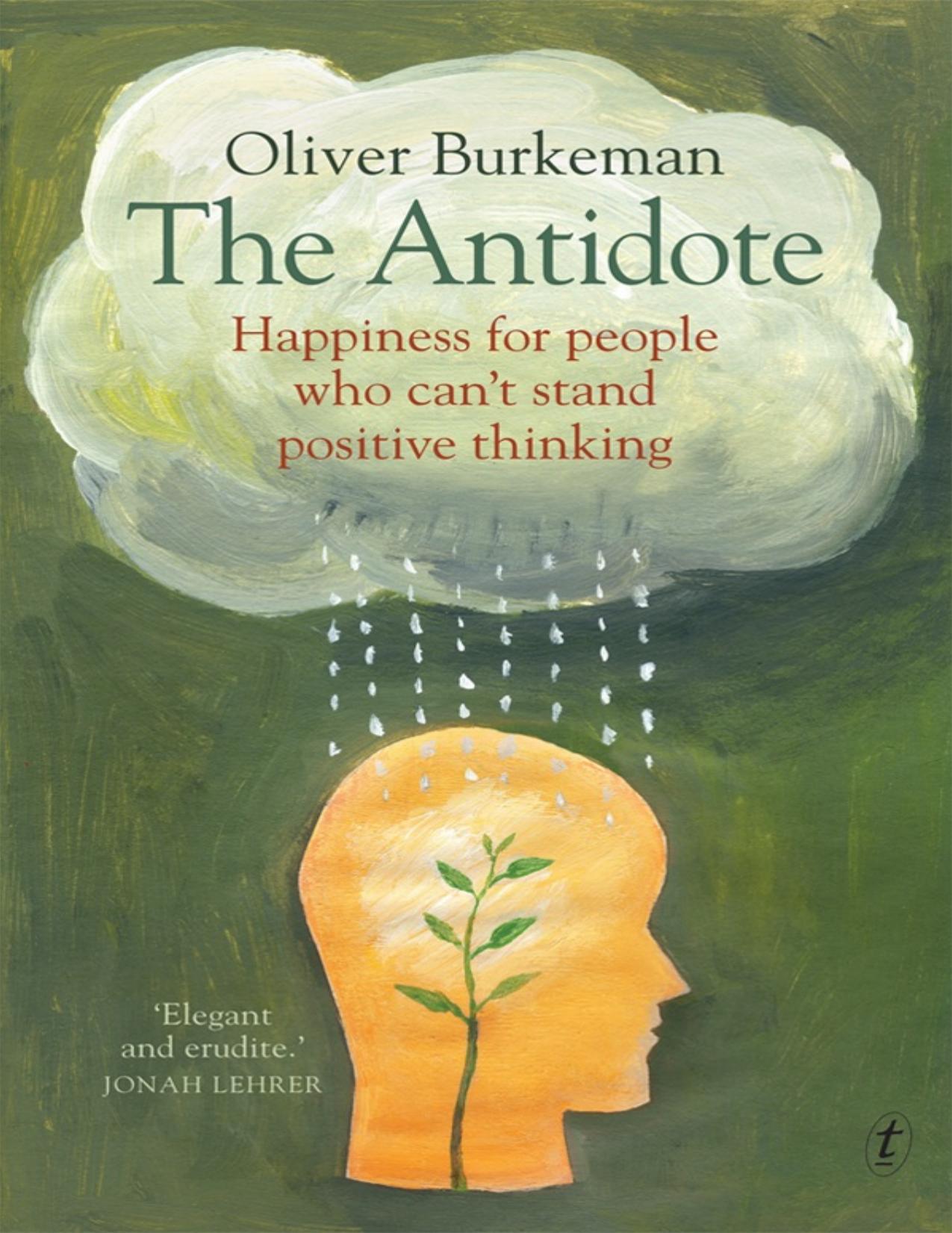The Antidote by Oliver Burkeman

Author:Oliver Burkeman
Language: eng
Format: mobi, epub, pdf
Tags: personal development, happiness, Self-Help
ISBN: 9781921921483
Publisher: The Text Publishing Company
Published: 2012-06-01T14:00:00+00:00
‘I cannot live with myself’: the phrase is a cliché, but Tolle was stopped dead by its implications. ‘If I cannot live with myself,’ he remembered thinking, ‘there must be two of me: the “I” and the “self” that “I” cannot live with. Maybe, I thought, only one of them is real. I was so stunned by this realisation that my mind stopped. I was conscious, but there were no more thoughts.’ And then, before he knew it, it was morning – the morning that he felt suffused with a feeling of ‘uninterrupted deep peace and bliss’.
What had happened, if his account is to be believed, was that he no longer mistakenly believed he was his thinking; he saw himself, instead, as the witness to it. This is an experience you can easily taste for yourself by deliberately deciding to watch your own thinking. Sit like a cat at a mouse-hole, Tolle advises, waiting to see what your next thought will be. ‘When you listen to a thought,’ he explains, ‘you are aware not only of the thought, but also of yourself as the witness of the thought. A new dimension of consciousness has come in. As you listen to the thought, you feel a conscious presence – your deeper self – behind or underneath the thought, as it were. The thought then loses its power over you, and quickly subsides, because you are no longer energising the mind through identification with it. This is the beginning of the end of involuntary and compulsive thinking.’ We have all experienced something ‘behind or underneath’ thought, in those moments that thinking seems temporarily to fall away: when gasping in awe at beautiful scenery, after intense physical exercise, or while making love. The trick is to take that stance towards thinking all the time, even when you’re thinking. If any this sounds familiar, it may be because it leads back to Buddhism. Watching your thoughts in this way is a form of meditation.
This is the point at which Tolle’s outlook gets especially tricky for a sceptic to swallow. He seems to assume that when you stop identifying with your ego, you discover who you really are – that you discover your ‘deeper self’ or your ‘true Being’, which was hiding behind the fake self all along. But this kind of talk rightly makes more mainstream philosophers nervous. Just because you have succeeded in dismantling the conventional understanding of the self, it doesn’t necessarily follow that you’ll find the ‘real’ one. Perhaps we are just a ‘bundle of perceptions’, as Hume put it. Perhaps there is no ‘deeper’, ‘truer’ meaning to the notion of who we are. Once again, though, this isn’t a question that we need to answer conclusively. Merely asking it is what matters. It is enough, for now, to enquire within: don’t you feel a certain tranquility when you seek to become the witness to your thoughts, rather than identifying with them completely?
The optimism-focused, goal-fixated, positive-thinking approach to happiness is exactly the kind of thing the ego loves.
Download
The Antidote by Oliver Burkeman.epub
The Antidote by Oliver Burkeman.pdf
This site does not store any files on its server. We only index and link to content provided by other sites. Please contact the content providers to delete copyright contents if any and email us, we'll remove relevant links or contents immediately.
Make Comics Like the Pros by Greg Pak(2425)
The Social Psychology of Inequality by Unknown(2312)
Stacked Decks by The Rotenberg Collection(2280)
Purple Hibiscus by Chimamanda Ngozi Adichie(1990)
The Art of Doom by Bethesda(1774)
The Queen of Nothing by Holly Black(1758)
Putin's Labyrinth(1661)
The Power of Habit: Why We Do What We Do in Life and Business by Charles Duhigg(1599)
Life of Elizabeth I by Alison Weir(1576)
Agency by William Gibson(1478)
Drawing Down the Moon by Margot Adler(1476)
Wall and Piece by Banksy(1461)
Things Are What You Make of Them: Life Advice for Creatives by Adam J. Kurtz(1453)
The Beatles Lyrics by Hunter Davies(1374)
Only What's Necessary: Charles M. Schulz and the Art of Peanuts by Chip Kidd(1374)
Art Of Atari by Tim Lapetino(1326)
The Andy Warhol Diaries by Andy Warhol(1257)
Uncanny Valley by Anna Wiener(1244)
The Economist (20150926) by calibre(1242)
